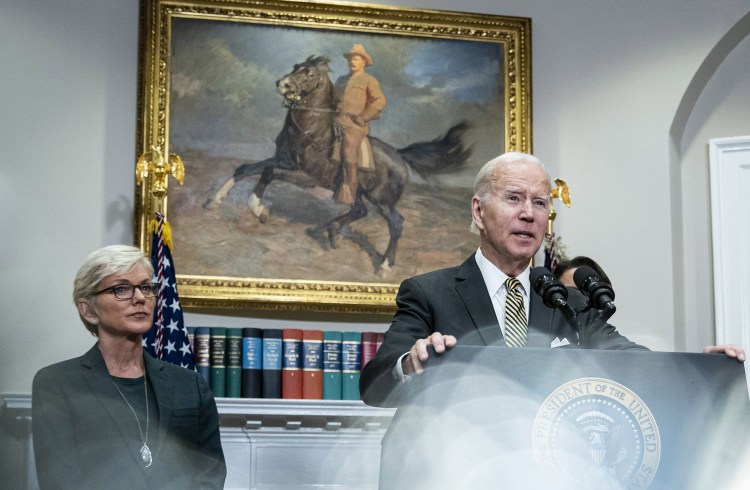President Joe Biden is considering requiring oil companies to store more fuel inside the U.S. as dwindling diesel stockpiles in the Northeast stoke concerns about price spikes this winter, Energy Secretary Jennifer Granholm said Tuesday.
While the U.S. remains a major exporter of diesel to European allies facing an energy crunch, “we also want to make sure there’s enough fuel in the United States,” Granholm told Bloomberg News in an interview at the COP27 climate conference in Egypt.
“It may not be a business choice that they make, but we’re asking, as the companies that are operating in America, to do what they are doing in other countries” where there are minimum fuel-storage requirements, Granholm said. “And that’s why the president is looking at that.”
Granholm’s statement marks the most explicit confirmation yet that the president is considering mandatory stockpile requirements in response to perilously low fuel inventories. U.S. East Coast distillates inventories, which include diesel and heating oil, are the lowest on record for this time of year. In New England, where more people burn fuel to heat their homes than anywhere else in the country, stockpiles are less than a third of typical levels.
Granholm and other administration officials have been weighing a host of options for responding to high fuel costs and low levels of distillates in the Northeast U.S.. The Biden administration could not act on its own to force oil companies to hold more fuel inside the U.S.; that change would have to come from Congress.
Legislation to expand the government’s 1 million-barrel Northeast Home Heating Oil Reserve is already pending on Capitol Hill, as lawmakers rush to complete a government spending bill during the lame-duck session. It “could be” the moment to move a mandatory fuel-inventory measure through Congress, Granholm allowed, adding: “It’s on the table.”
Oil industry representatives have warned against such a mandate, saying it would increase holding costs and could boost prices in the short term.
The administration also has weighed export restrictions, though energy analysts have warned curbs on foreign fuel sales could backfire by boosting prices in the Northeast U.S., which relies on imports to meet some of the region’s energy needs.
Fuel export curbs remain an option, Granholm said, but “I don’t think it’s at the top of the list.”
Granholm, who is at the UN climate summit touting investments in hydrogen, batteries and other clean-energy tech catalyzed by the Inflation Reduction Act and bipartisan infrastructure law, stressed that the U.S. is working to help European allies weaning themselves off Russian gas even as it takes care of domestic energy security needs and tries to shift away from fossil fuels.
“People understand that this is a transition and it has to be smartly managed, and you can accelerate production of home heating fuel or LNG or gasoline for vehicles – you can accelerate production to keep prices affordable at the same time as you’re accelerating this growth of clean energy,” she said.
“With Russia’s invasion of Ukraine it is a different ballgame than it was a year ago – it just is – and that has really accelerated this move toward clean and energy independence, but at the same time you have to find ways to be sure people are not hurt.”
Send questions/comments to the editors.



Comments are no longer available on this story